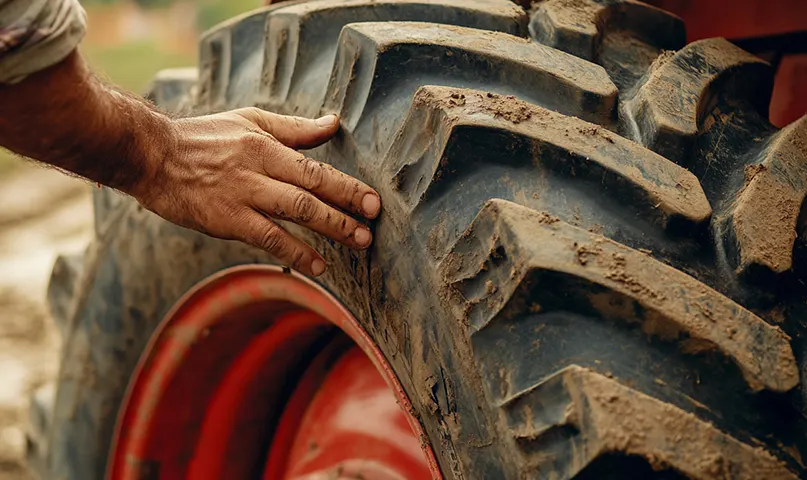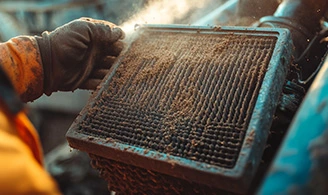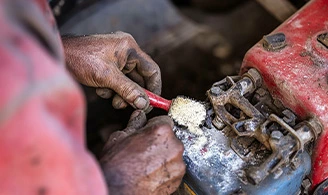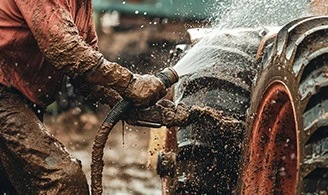How to maximize your tractor's lifespan with simple maintenance tips

Tractors are the backbone of modern farming, helping farmers perform a wide range of essential tasks with efficiency and ease. Whether you're using a tractor for tilling, plowing, hauling, or other heavy-duty tasks, ensuring its longevity is critical. A well-maintained tractor can save you money on repairs, increase its performance, and keep it running smoothly for years to come. Fortunately, taking proper care of your tractor doesn't require complex procedures. With some simple, regular maintenance tasks, you can maximize your tractor's lifespan.
In this blog, we'll walk you through some essential maintenance tips that can help extend the life of your tractor and keep it in peak operating condition.
1. Regularly check and change the oil

Oil is essential for keeping your tractor's engine running smoothly by lubricating the internal components, reducing friction, and preventing overheating. Over time, oil degrades and becomes less effective, so changing the oil regularly is one of the most important maintenance tasks.
- Oil change frequency: Depending on the type of oil and how much you use your tractor, it's generally recommended to change the oil every 100-150 hours of operation. Always refer to your tractor's owner's manual for specific recommendations.
- Check oil levels: Before every use, check the oil level to ensure it's within the recommended range. Low oil levels can lead to engine wear and potential failure.
By changing the oil regularly and keeping it at the right level, you help reduce engine strain, prevent overheating, and extend the life of your tractor.
2. Maintain the air filter

The air filter is another key component for ensuring your tractor runs smoothly. It prevents dirt, dust, and debris from entering the engine and causing damage. If the air filter becomes clogged, it can reduce engine performance, lower fuel efficiency, and even lead to engine failure.
- Regular inspection: Check the air filter periodically for any signs of dirt buildup or clogging, especially if you're operating the tractor in dusty or muddy conditions.
- Clean or replace: If the filter appears dirty but isn't damaged, you can clean it with compressed air. However, if it's too worn or clogged, replace it with a new one. Always consult the manufacturer's instructions for the right maintenance procedure.
A clean air filter ensures your engine gets enough clean air, which improves combustion and keeps your tractor running efficiently.
3. Check the radiator and coolant levels

Tractors often work in hot and heavy-duty environments, which means the engine generates a lot of heat. To keep your tractor from overheating, it's important to maintain the radiator and ensure that coolant levels are adequate.
- Inspect the radiator: Regularly inspect the radiator for signs of leaks, blockages, or debris buildup. A clean, unobstructed radiator helps with optimal cooling.
- Coolant levels: Ensure that your tractor's coolant is topped up and hasn't deteriorated. Low coolant levels can lead to overheating and damage to the engine.
A properly functioning radiator and optimal coolant levels prevent overheating, extending the life of your tractor's engine and improving its performance.
4. Inspect and maintain the battery

Your tractor's battery is essential for starting the engine and powering electrical systems. Over time, the battery may lose charge or the terminals may become corroded, affecting performance.
- Clean the battery terminals: Check the battery terminals regularly for corrosion (which looks like a white, powdery substance). Clean them with a mixture of baking soda and water to maintain a good connection.
- Test battery health: If the battery is old or struggling to hold a charge, consider replacing it. It's recommended to test the battery's charge and condition every year.
Maintaining the battery ensures your tractor starts reliably and reduces the chances of electrical issues.
5. Lubricate moving parts

Tractors have many moving parts, including joints, pivots, and axles, that require regular lubrication to reduce wear and tear. Keeping these parts properly lubricated ensures smoother operation and less friction, which can extend the life of your tractor.
- Lubrication schedule: Consult your tractor's manual for the recommended lubrication intervals. Use high-quality grease or lubricants that are suitable for the specific parts of your tractor.
- Check the hydraulics: Don't forget to regularly check and lubricate the hydraulic system as well. Properly maintained hydraulics contribute to smoother, more efficient operation, especially when lifting or towing.
Proper lubrication minimizes friction and wear on critical components, keeping your tractor running smoothly for longer.
6. Inspect and maintain the tyres

Tires play a crucial role in a tractor's performance, especially when working in fields with uneven or challenging terrain. If your tractor tires are underinflated, overinflated, or worn out, it can affect fuel efficiency, traction, and stability.
- Check Tyre Pressure: Inspect the tire pressure regularly. Low tyre pressure can cause poor fuel efficiency and uneven wear, while overinflated tires can be prone to damage.
- Inspect for damage: Look for any visible signs of cracks, cuts, or bulges in the tires. These can compromise the tractor's ability to operate safely and efficiently.
- Tyre rotation: If possible, rotate the tires to ensure even wear. This is especially important if you're working on uneven terrain.
Maintaining the correct tire pressure and ensuring that your tires are in good condition improves the tractor's traction and fuel efficiency, helping it work optimally.
7. Clean the tractor after every use

After a long day of work, it's tempting to leave your tractor dirty, but cleaning it regularly helps maintain its condition. Dirt, mud, and debris can cause components to wear out faster or cause rust and corrosion over time.
- Wash the exterior: Clean the tractor's exterior, including the frame, wheels, and engine area. This helps prevent dirt buildup and allows you to spot any potential issues like leaks or wear.
- Remove debris: Clear out any debris that might accumulate in hard-to-reach areas. This helps to prevent blockages, especially around the radiator or air intake.
Cleaning your tractor reduces wear on external parts and keeps the machinery in good working condition.
8. Follow the manufacturer's maintenance schedule

Each tractor model comes with a recommended maintenance schedule, typically found in the owner's manual. Adhering to this schedule ensures that every part of the tractor is serviced at the right intervals and helps prevent major issues from arising.
- Check the manual: Refer to the owner's manual for specific maintenance intervals and procedures for your tractor model.
- Plan regular servicing: Schedule regular servicing with a professional mechanic if needed, especially for tasks like changing hydraulic fluids, adjusting belts, or inspecting engine components.
Following the manufacturer's recommendations ensures that your tractor is serviced properly, minimizing the risk of breakdowns and extending its useful life.
9. Store the tractor properly

Where and how you store your tractor plays a significant role in its lifespan. Exposure to harsh weather conditions, such as extreme heat, cold, or moisture, can cause rust, battery drainage, and other forms of wear.
- Store in a dry, covered area: Whenever possible, store your tractor in a garage or shed that protects it from the elements.
- Protect from pests: Ensure that rodents or other pests don't have access to your tractor, as they can damage wiring or other components.
Proper storage helps protect your tractor from environmental damage and keeps it in better condition over the long term.
Conclusion
Maximizing the lifespan of your tractor doesn't require a lot of time or money, just consistent and simple maintenance practices. Regular oil changes, checking coolant levels, inspecting tires, cleaning, and adhering to the manufacturer's maintenance schedule are all essential steps in keeping your tractor running at its best. By following these simple tips, you'll ensure your tractor remains a reliable and efficient workhorse for years, saving you money on repairs and reducing downtime in your agricultural operations. Proper care and attention will not only extend its life but also ensure optimal performance when you need it the most
















